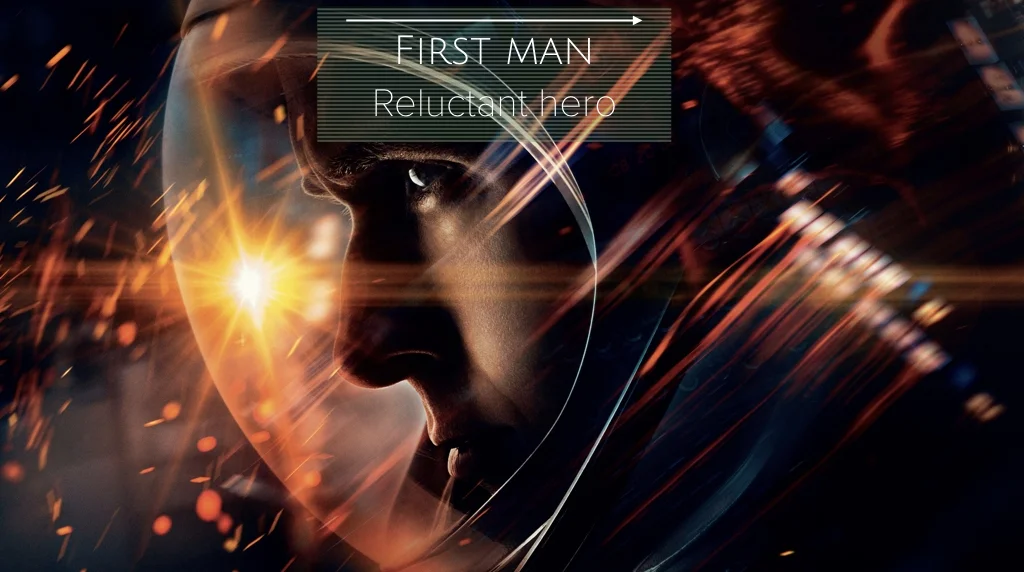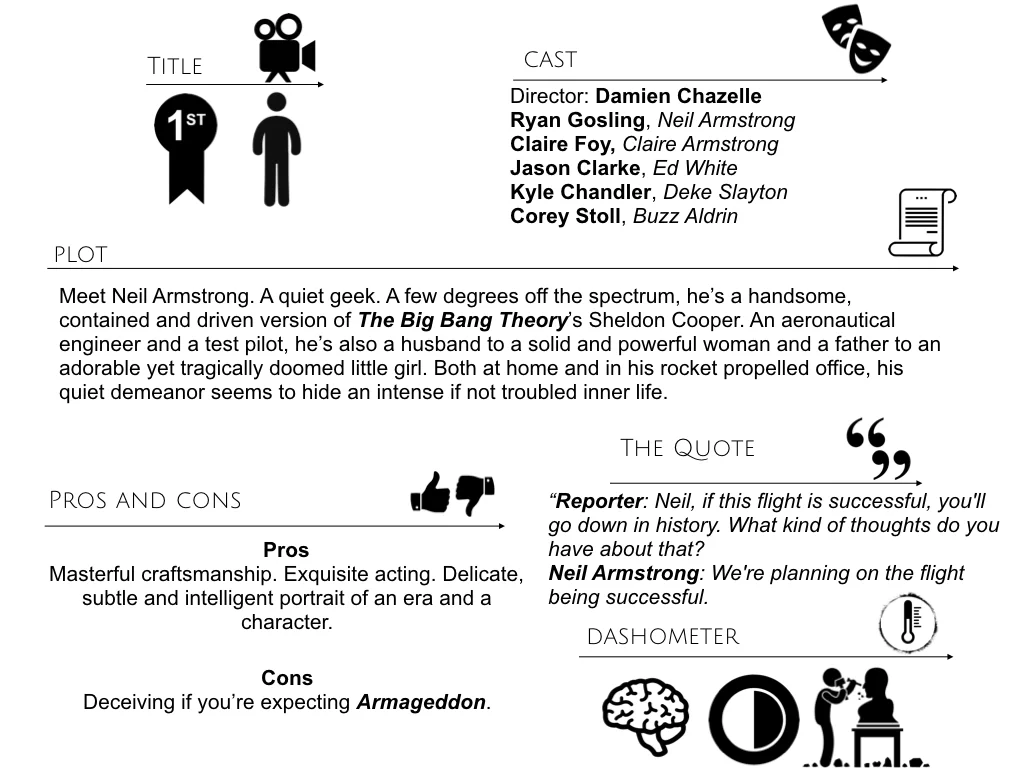First Man: Reluctant hero.
First Man: Reluctant Hero
“I'm not the man they think I am at home
Oh no no no I'm a rocket man”
Elton John, Rocket Man
Plot
Meet Neil Armstrong. A quiet geek. A few degrees off the spectrum, he’s a handsome, contained and driven version of The Big Bang Theory’s Sheldon Cooper. An aeronautical engineer and a test pilot, he’s also a husband to a solid and powerful woman and a father to an adorable yet tragically doomed little girl. Both at home and in his rocket propelled office, his quiet demeanor seems to hide an intense if not troubled inner life. So much so that his hierarchy in the Air Force feels his focus is off and decides to ground him. A wingless pilot is a frustrated man. So, Neil applies to the NASA’s Gemini Space program looking for his second team of astronauts. History is in the making.
Meanwhile in America it’s the 60s. It’s a good time to be an American (especially if you are a college educated white man of course). Fuel seems to be an unlimited resource, and the country is striving. The whole country seems to be focused on inventing and building new machines that burn lots of it. Since it seems that launching rockets at each other is no longer a reasonable option, on account of the proliferating nuclear capabilities of the two world Giants, they decide to launch them to space. We got ourselves an international pissing contest! The Cold War excites National and individual masculine egos projected into everbigger, faster and further-going rockets.
It is time for the great American heroes to rise and write new chapters of the star-spangled legend. The country is waiting for its new Captain America, a bold, handsome, fearless, brash and loud talking alpha male to plant the flag of world domination high enough for every one on planet earth to see.
Neil Armstrong is not that man. And yet…
Dashometer
Let’s start by a confession. I love movies about the space conquest. Philip Kaufman’s The Right Stuff(1983) and Ron Howard’s Apollo 13(1995) to name just two, strongly colored my imagination. As I was driving to the theater to see Damien Chazelle’s First Man, my heart was racing and I operated my car as if it were a spacecraft. “Deeshdash 7, standing by for lift-off, ignition in 10, 9, 8” – I turned on the ignition key, pressed the headlights button, released the handbrake, pulled the turning-signal handle - “Houston this is Deeshdash 7 we are go!” – I pulled down my visor, opened my sun roof and felt the thrust of my engine propelling me forward! I was Sam Shepard/Chuck Yeager chasing Mach I again, I was Tom Hanks/Jim Lovell trying to bring his Apollo module back to earth, and I was about to upgrade to Ryan Gosling/Neil Armstrong soon!
Ryan Gosling, First Man
Sam Shepard, The Right Stuff
…except that… First Man is not really that kind of movie. I should say it’s not only that kind of movie. You certainly get a few intense thrills but the most powerful emotions come from elsewhere.
It’s a celebration of contrasts. A film about the extraordinary space conquest and the moon landing that doesn’t place stock on its thrilling action scenes but on its troubled central character. A film about one of the most iconic American heroes which sheds light on a man whose personality dismantles the popular model of heroism. A film celebrating one of the greatest accomplishments of mankind while exposing its absurd silliness. It is an ode to the genius and the vanity of the human spirit, a painting of the core energies and fictions that propel it: love, grief, curiosity. His take on the Moon Landing and the story of the first man ever to walk on earth’s satellite clearly bears his unmistakable stylistic signature. It is aesthetically impeccable. The photography is enthralling and obsessively accurate from the character-defining earth scenes to the challenging space scenes. The acting is once again admirably on point. Ryan Gosling, all in restraint manages to cut new angles in his craft and paint an inward Neil Armstrong as compelling as he is reluctant to express emotions, as fascinating as he is boring, as wounded as he is talented and ultimately as heroic in spite of himself as he is humble. Claire Foy plays Janet Armstrong, a pillar of strength who transcends her condition as a woman in the 60s, keeping men in check and her home together. Her interpretation is physically impressive, much of her strong presence being exuded through her intense gaze and facial expressions in moments of heavy silence with her husband. With each new film Chazelle is carving his place amongst the most accomplished cinematographers of our times (Paul Thomas Anderson, Darren Aronofsky etc.) while keeping an appeal to wider audiences.
Claire Foy as Janet Armstrong
He is not controversial. Even the most die-hard outrage-addict would be hard pressed to find something to chew on and spit some righteous bile over Whiplash(2014) or La La Land(2016). The news that his next film was the Neil Armstrong story was therefore intriguing from the get go.As the world seems to be inexorably sliding back into obscurantism, succumbing once again to the venomous calls of stealth fascism, vaporizing its toxic melodies to excite polarization on all scales, the tale of the Moon landing, landmark of the Cold War and Nationalist semiology is much more slippery than the story of a young drummer and his teacher or a struggling musician and an aspiring young actress falling in love. If not approached through a full-out gung-ho celebration of red-white-and-blue testosterone, the subject would be mined in the current zeitgeist of righteous indignation, perpetual political anger and moral panic. More than the Moon race, the 60s is in itself a heavily charged time of history. Political-correctness, extreme partisanship and the business of social-media outrage are looming over every form of expression no matter how benign and good intentioned. It seemed therefore inevitable that First Manwould draw criticism and spark on-line controversy. The film was accused of being “anti-American” because (spoiler alert) it did not show the flag planting moment and Ryan Gosling said during an interview that he thought Armstrong did not think of himself as an American Hero. The criticism soon died after both Armstrong’s sons defended the film and its portrayal of their father.
And yet, in its subtlety, First Manis a very political movie. Politics in the lost, noble sense of the term. With a carefully light touch and impressionist sensibility it composes marvelous contrasts that emphasize everything that was anticlimactic and heroic about this “reluctant hero” (as John Glenn later described Neil Armstrong), that was foolish and grandiose about that quest to reach the Moon (“You are a bunch of boys making models out of balsa wood. You have nothing under control”. Janet Armstrong), what was blessed and cursed about that decade (Gil Scot Heron’s “Whitey on the Moon”). First Manavoids all the pitfalls and traps of the genre while confronting all of them intelligently and courageously. It embraces everything that is complex, miraculous and ultimately doomed about mankind even though it only promises the moon.








